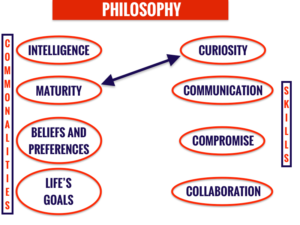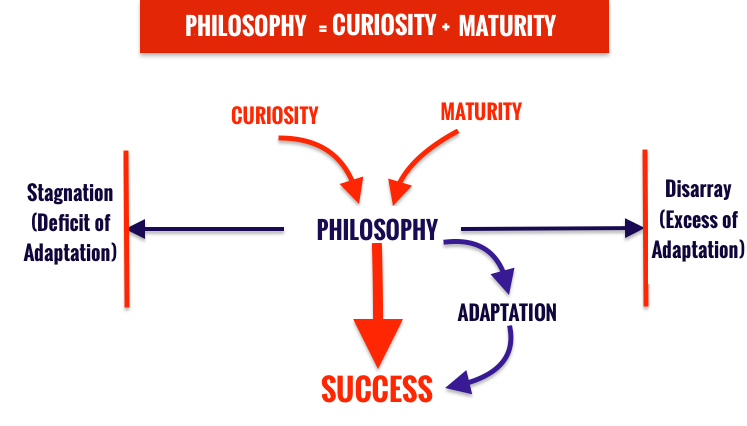Philosophy is a combination of the skill of curiosity with the trait of maturity. Curiosity, you may remember, is largely composed of the core psychological skill of Observing Ego, paired with an educated eye, full of "left brain" ability for detail, history, and organization. It has bearing on our performance in phase three - intellectual attraction - step eight, where we seek to amplify the best virtues toward our goals.

Philosophy is the pursuit of wisdom, and it is also the one academic discipline most known for, and dependent on, curiosity. That which is wise and full of virtue is also that which is most mature about human beings.

Nothing could be more crucial for starting toward one's goals, because if one doesn't know why they are even trying for a goal, how could they possibly ever complete one. It is intangible force - even trite to conceive of - but the truth of whether a goal will ever even be set, let alone achieved, rests in "why" one would even want to.
The partner with a gift for philosophy helps us with this, and in their careers, might often become a counselor or member of the clergy.
Just like any of the mature character virtues, Philosophy falls on a spectrum of the Golden Mean, between the excess of Philosophy, which is Disarray , and a deficit of philosophy, which is Stagnation in one's personal growth. Philosophy at its best, in balance, will give us the ability to adapt to what comes our way in life, and turn that into success.
If Einstein had no special talents, and was “only passionately curious,” then given that he was both a mature and curious man, we might wonder if rather than losing the ability to “have eyes as a child” as we age, it might be more appropriate to tie our curiosity and maturity to the saying, “The older I grow, the less I know.”
This is a perspective needed in committed relationships as a facet of curiosity because it is akin to intellectual humility, which is mature, and the opposite of pathological narcissim. It is also an embrace of change, with a realistic assessment of the pace which one can muster, yet with the willingness to go with the flow of life, ready to be surprised by change, rather than to rebel against it. “The older I grow, the less I know.”
Because of this humility within maturity, when obstacles get in the way of our goals, we can actually apply curiosity to them instead of fear, desperation or defeat, and actually go through a process of synthesis of the actual obstacle into valuable information and new directions that amount to none other than a “renaissance” in our lives.

